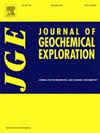The science of food safety and their health impacts
IF 3.4
2区 地球科学
Q1 GEOCHEMISTRY & GEOPHYSICS
引用次数: 0
Abstract
The pervasive issue of food and nutrition security demands urgent attention on a global scale. This challenge affects diverse populations worldwide and is compounded by multifaceted factors. Achieving sustainable food and nutrition security for smallholders and communities necessitates a comprehensive, interdisciplinary strategy, urging collaboration among experts from various fields. Addressing this complex issue requires innovative, unconventional approaches to surmount existing challenges. Challenges such as insufficient resources, inadequate infrastructure, and limited market accesses are formidable barriers that must be dismantled for effective progress. To overcome these hurdles, it is imperative to identify existing building blocks across diverse sectors. Leveraging these building blocks can pave the way for an incremental progress strategy, steering us towards a holistic systems vision. An incremental approach allows for the integration of diverse components within the food and nutrition system. By identifying synergies and interrelated, systems-oriented strategies can enhance the resilience and efficiency of the entire food and nutrition ecosystem. A holistic and integrated perspective addresses the root causes of these issues, offering a path towards a more sustainable and equitable food system. Embracing such an approach is crucial in shaping a resilient future, safeguarding global communities against the persistent challenges of food and nutrition insecurity.
食品安全科学及其对健康的影响
普遍存在的粮食和营养安全问题亟需全球关注。这一挑战影响着世界各地的不同人群,并受到多方面因素的影响。要为小农和社区实现可持续的粮食和营养安全,就必须采取全面的跨学科战略,并敦促各领域专家开展合作。要解决这个复杂的问题,就必须采取创新的、非常规的方法来克服现有的挑战。资源不足、基础设施不完善、市场准入受限等挑战是取得有效进展必须消除的巨大障碍。要克服这些障碍,当务之急是确定各部门现有的组成部分。利用这些基石可以为渐进式发展战略铺平道路,引导我们实现全面的系统愿景。循序渐进的方法可以整合粮食和营养系统中的不同组成部分。通过确定协同作用和相互关联,以系统为导向的战略可以提高整个粮食和营养生态系统的复原力和效率。全面综合的视角可解决这些问题的根源,为实现更可持续、更公平的粮食系统提供路径。采用这种方法对于塑造具有复原力的未来、保护全球社区免受粮食和营养不安全的持续挑战至关重要。
本文章由计算机程序翻译,如有差异,请以英文原文为准。
求助全文
约1分钟内获得全文
求助全文
来源期刊

Journal of Geochemical Exploration
地学-地球化学与地球物理
CiteScore
7.40
自引率
7.70%
发文量
148
审稿时长
8.1 months
期刊介绍:
Journal of Geochemical Exploration is mostly dedicated to publication of original studies in exploration and environmental geochemistry and related topics.
Contributions considered of prevalent interest for the journal include researches based on the application of innovative methods to:
define the genesis and the evolution of mineral deposits including transfer of elements in large-scale mineralized areas.
analyze complex systems at the boundaries between bio-geochemistry, metal transport and mineral accumulation.
evaluate effects of historical mining activities on the surface environment.
trace pollutant sources and define their fate and transport models in the near-surface and surface environments involving solid, fluid and aerial matrices.
assess and quantify natural and technogenic radioactivity in the environment.
determine geochemical anomalies and set baseline reference values using compositional data analysis, multivariate statistics and geo-spatial analysis.
assess the impacts of anthropogenic contamination on ecosystems and human health at local and regional scale to prioritize and classify risks through deterministic and stochastic approaches.
Papers dedicated to the presentation of newly developed methods in analytical geochemistry to be applied in the field or in laboratory are also within the topics of interest for the journal.
 求助内容:
求助内容: 应助结果提醒方式:
应助结果提醒方式:


